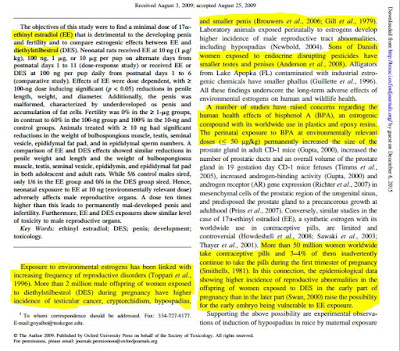In a study titled "Mal-Development of the Penis and Loss of Fertility in Male Rats Treated Neonatally with Female Contraceptive 17a-Ethinyl Estradiol: A Dose-Response Study and a Comparative Study with a Known Estrogenic Teratogen Diethylstilbestrol", we can read in detail how some of those findings are reported:
In an interview by The Independent , scientists tell us that the habit and lifestyle of mothers are to blame for the low sperm counts afflicting modern men, compared to men from 70 years ago:
'There is now an emerging consensus among some experts that whatever it is that is exacerbating the problems of male infertility, it probably starts in the womb. It is not the lifestyle of men that is problem, but that of their mothers.
For example, men whose pregnant mothers were exposed to high levels of toxic dioxins as a result of the 1976 industrial accident in Seveso, Italy have been found to have lower-than-average sperm counts. But men exposed to dioxins in adulthood showed no such effect. Another study found women who ate large amounts of beef during pregnancy, a diet rich in potentially damaging chemicals called polycyclic aromatic hydrocarbons (PAHs), had sons with relatively low sperm counts. But eating beef as an adult man shows no similar impact.
One of the strongest pieces of evidence in support of this idea comes from studies of people who smoke. A man who smokes typically reduces his sperm count by a modest 15 per cent or so, which is probably reversible if he quits. However, a man whose mother smoked during pregnancy has a fairly dramatic decrease in sperm counts of up to 40 per cent – which also tends to be irreversible.
This is proving tricky. Obesity, for instance, is a growing problem and it has been linked with reproductive problems in both men and women. One study has also indicated that overweight pregnant women tend to produce sons with poor semen quality.'
A 2006 report on male infertility by sciencenews informs that women who drink while pregnant are heavy contributors to male infertility:
In Men's Health magazine, we learn the story of Army vet James Price who by consuming soy (which contains hormones that mimic estrogen), developed rather feminine traits such as enlarged breasts and being sensitive and too emotional. In the same article studies are offered to explain that his soy consumption causes men to have such issues as he was having:
'James Price's breasts had been painful and swollen. It looked as if gum balls were implanted underneath each nipple. The slightest touch triggered throbs.
For Price, a retired U.S. Army intelligence officer who once flew attack helicopters in Vietnam, these changes were more than just physically uncomfortable. "Men aren't supposed to have breasts," he says today in a quiet Texas drawl. "It was like my body was feminizing."
A lean and wiry man, the breast development stood in stark contrast to the rest of his body. But it was not Price's only symptom. His beard growth had slowed, he'd lost hair from his arms, chest, and legs, and he'd stopped waking up with morning erections. "My sexual desire disappeared," he says. "My penis—I won't say it atrophied, but it was so flaccid that it looked very small in comparison with the way it used to be. Even my emotions changed."
Mood swings and a decrease in libido are not unusual companions to bereavement. But Price had a nagging sense that something was off. "I was becoming much more sentimental," he recalls, describing his emotions as almost feminine. "I'd break out and cry at a sad movie, that kind of thing. It just wasn't like me."
In a Harvard study published last year in the journal Human Reproduction, Jorge E. Chavarro, M.D., Sc.D., and his colleagues found a strong association between men's consumption of soy foods and decreased sperm counts. Ninety-nine men reported their intake of 15 different soy-based foods, then underwent semen analysis. Those in the highest category of daily soy intake averaged 32 percent fewer sperm per milliliter of ejaculate than those who went sans soy.
What's more, studies of these phytoestrogens in leading peer-reviewed medical journals suggest that even lower doses—such as the amount in the 25-gram soy protein target cited by the FDA—have the potential to wreak hormonal havoc.
Addendum: One more thing that has been catching my attention lately; men with feminized hips. These are the males who have wide hips, making them pear-shaped. The width of their hips causes them to walk with a swishy waddle. My take is that the sons of these mothers that are causing their boys to be feminized by either hormones or bad habits, are passing down their dysfunctions to their male descendants.
If this trend is real, it could be the result of an epigenetic-type alteration being encoded in our own genetic make-up.
Probably not, but worth the speculation. Could multiple environmental estrogenic insults be a factor in changing Western men’s DNA so that they are conceiving males with strangely feminine irregularities?


No comments:
Post a Comment